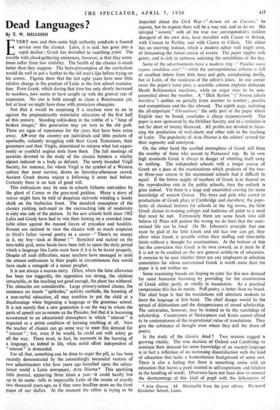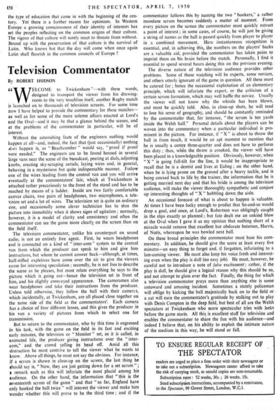Dead Languages?
By T. W. MELLIJISH
EVERY now and then some high authority conducts a funeral service over the classics. Latin, it is said, has gone into a rapid decline ; Greek has dwindled to vanishing point. The trouble with cloud-gathering eminences, however, is that they some- times suffer from low visibility. The health of the classics is much better than they suppose. The heirs-presumptive of the curriculum would do well to put a feather to the old man's lips before trying on his crown. Figures show that the last eight years have seen little relative change in the position of Latin at the first school examina- tion. Even Greek, which during that time has only slowly increased its numbers, now seems to have caught up with the general rate of expansion. No one is bold enough to claim a Renaissance yet, but at least we might have done with premature obsequies.
Not that it would be surprising if a reaction were to set in against the preponderantly materialist education of the first half of this century. Standing ankle-deep in the rubble of a "heap of broken images," this generation may yet turn to the old gods. There are signs of repentance for the years that have been eaten away. AK- over the country are individuals and little pockets of opsimaths, valiantly struggling with their Greek Testaments, their grammars and their Virgils, determined to retrieve what lost oppor- tunity or youthful neglect stole from them. The full meetings of societies devoted to the study of the classics betoken a vitality alhnost indecent in a body so defunct. The newly founded Virgil Society, for instance, for whom Virgil is the symbol of a Western culture that must survive, draws its Saturday-afternoon crowd. Ancient Greek drama enjoys a following it never had before. Certainly there is no lack of good will.
This enthusiasm may be seen in schools hitherto untrodden by the ghost of Caesar or the grey-eyed goddess. Many a story of valour might here be told of desperate stalwarts wielding a lonely chalk on the barbarian front. The standard conception of the classics yielding inch-meal to the encroaching tide of modernity is only one side of the picture. In the new schools built since 1902 Latin and Greek have had to win their footing on a crowded time- table often against the massed forces of prejudice and hostility. Parents are inclined to view the classics with as much suspicion as Ovid's father viewed poetry as a career—" There's no money in it, my boy—look at Homer ! " Stretched and racked on the time-table grid, some heads have been loth to spare the daily period which a language like Latin must have if it is to be learnt properly. Despite all such difficulties, many teachers have managed to instil the utmost enthusiasm in their pupils in circumstances that would have made a renegade of a minor prophet.
It is not always a success story. Often, where-the time allowance has been too niggardly, the opposition too strong, the children intractable, or the teaching not good enough, the plant has withered. The obstacles are considerable. Large primary-school classes, the insistence on innate "aptitudes," activity- methods, the boosting of a non-verbal education, all may combine to put the child at a disadvantage when beginning a language at the grammar school. It is not merely that a new generation is on the way to whom the parts of speech are as remote as the Pleiades, but that it is becoming accustomed to an educational atmosphere in which " interest " is expected as a prime condition of learning anything at all. Now the teacher of classics can go some way to meet this demand for " interest " ; but, even if he would, he could not with safety go all the way. There must, in fact, be moments in the learning of a language, as indeed in life, when stolid effort independent of " interest " is demanded.
For all that, something can be done to sugar the pill, as has been recently demonstrated by the astonishingly successful venture of two schoolmasters who four years ago launched upon the educa- tional world a Latin newspaper, Acta Diurna.* This sparkling little journal, appearing three times a year—it could hardly live up to its name—tells in impeccable Latin of- the events of exactly two thousand years ago, as if they were headline news on the front pages of our -dailies. At the moment the editor is trying to be
impartial about the Civil War—" Actum est de Caesare," he reports, but he expects there will be a way out, and so do we 1-us intrepid " notarii," with all the true war correspondent's reckless disregard of his own skin, have travelled with Caesar to Britain, with Crassus to Parthia and with Cicero to Cilicia. The editor has an unerring instinct, which a modern editor well might envy, of forecasting the future course of events. The paper ripples with gaiety, and is rich in cartoons satirising the notabilities of the day.
Some of the advertisements have a modern ring—" Putabat suant togam candidam esse! "—while the correspondence column is full of excellent letters from little boys and girls, complaining shrilly, but in Latin, of the weakness of the editor's jokes. In one corner raves the paper's tame poet, a scientific column explains elaborate Heath Robinsonian machines, while an augur tries to be non- committal about the weather. A "Dick Barton" ("Nostra fabula horrifica") ambles on genially from number to number ; puzzles and competitions and the like abound. The eighth page, including the all-important " Glossarium," the only part of the paper where English may be found, concludes a cheap sixpennyworth. The paper is now sponsored by the Orbilian Society, and its c:rculation is not far short of twenty thousand. All profits are devoted to finan- cing the production of wall-charts and other aids to the teaching of Latin. The popularity of Acta Diurna is the editors' reward for their ingenuity and enterprise.
On the other hand the rarefied atmosphere of Greek still thins the number of those who mount to Parnassus' top. By its own high standards Greek is always in danger of whittling itself away to nothing. The independent schools with a longer course of Greek set a pace at the examinations which products of the two- or three-year course in the maintained schools find it difficult to equal. If the future supply of teachers of Greek is to depend on the reproduction rate in the public schools, then the outlook is grim indeed. Yet there is a huge and unsatisfied craving for more knowledge of ancient Greece. The boys and girls who crowd to productions of Greek plays at Cambridge and elsewhere, the popu- larity of classical lectures for schools in the big towns, the little Greek classes in training colleges and institutes all point to a need that must be met. Fortunately there are some heads who still believe (if Plato will pardon the wrong we do him) that the unex- amined life can be lived. On Dr. Johnson's principle that one must be glad of the little Greek and old lace one can get, they allow what Greek is possible within their staffing and time-table limits without a thought for examinations. At the bottom of this lies the conviction that Greek is its own reward, as it must be if It is not to be credited on the new general certificate of education. It remains to be seen whether there are any employers or selection committees for whom unexamined Greek is worth more than the paper it is not written on.
Some examining boards are hoping to cater for this new demand for some humanist leavening by providing for the examination of Greek either partly or wholly in translation. As a practical compromise this has its merits. Puff-pastry is better than no bread. The chief hope is that the translations will stimulate students to learn the language at first hand. The chief .danger would be the spread of dilettantism and the disappearance of sound scholarship. The universities, however, may be trusted to be the watchdogs of scholarship. Countrymen of Shakespeare and Keats cannot afford to be contemptuous of the inspirational value of translations. They give the substance of thought even where they dull the sheen of poetry.
Is the study of the classics dead ? Two reasons suggest a growing vitality. The wise decision of Oxford and Cambridge to continue their demand for some knowledge of an ancient language is in fact a reflection of an increasing dissatisfaction with the kind of education that lacks a humanitarian background of some sort. There is also a feeling that there is something amiss with an education that leaves a pupil stunted in self-expression and helpless in the handling of words. Observers have not been slow to connect the shortcomings of this kind of pupil with the deficiencies of Acta Diurna. 6d. Obtainable from the joint editors. Blackpoof Grammar School, Lancs.
the type of education that came in with the beginning of the cen- tury. Yet there is a further reason for optimism. In Western Europe a growing consciousness of their identity of interests has set the peoples reflecting on the common origins of their culture. The vigour of that culture will surely react to threats from without. Bound up with the preservation of that culture is the survival of Latin. Who knows but that the day will come when once again Latin shall flourish in the common councils of Europe ?







































 Previous page
Previous page